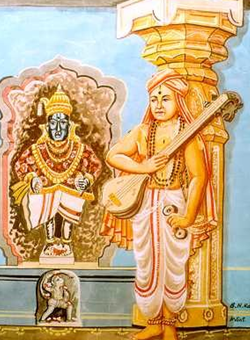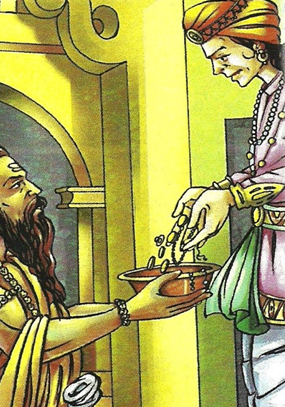Talk:The Āḻvār Saints:Purandaradāsa
By Vishal Agarwal
Purandaradāsa was born to a very kind trader and jeweller, Varadappa Naik, and his wife after the couple prayed to Bhagavān Veṅkaṭeśvara for a child. Varadappa was very wealthy but also very compassionate towards the poor and needy.
In his old age, Varadappa handed over his gem and pawning shop to his son, Śrīnivāsa, and married him to a pious woman named Sarasvatī. Śrīnivāsa completely changed the nature of the business. Unlike his father, he was extremely business-minded and hard-hearted. He cared only about maximising profits and gave nothing from his income in charity to the poor. He drove very hard bargains with the needy and had no pity for their suffering. Because of his miserliness and business skills, the family business greatly prospered.
Sarasvatī, on the other hand, was kind-hearted and liked to help the poor. But Śrīnivāsa forbade her to give anything in charity to anyone. Varadappa tried to make his son see the virtues of sharing and caring, but to no avail.
One day, Varadappa fell very sick. The physician suggested giving him the ash of some burned precious gems as medicine. The miserly Śrīnivāsa rejected the idea of spending a large amount of money to procure the gems. Sarasvatī reasoned with her husband, saying that her father-in-law’s life was more precious than any gem, but he coldly replied, “Father is very old and will die one day anyway. Why waste money on gems for medicinal ash?” Soon after, Varadappa died.
Śrīnivāsa continued his merciless pawnbroking and amassed so much wealth that people nicknamed him Navakoṭi – “the owner of ninety million.”
One day, a poor Brāhmaṇa came to beg for some money to perform the thread ceremony of his son. Śrīnivāsa, by now notorious for his miserliness, was surprised that someone had actually come to ask him for money. Instead of refusing outright, he told the Brāhmaṇa to come the next day. When the Brāhmaṇa returned, Śrīnivāsa again asked him to come later. This continued for months, but the miser never relented.
One day, while cleaning his shop, Śrīnivāsa found a box of fake and worthless coins. The next time the Brāhmaṇa came, he gave him that box, saying, “This should be enough for your son’s thread ceremony.”
The Brāhmaṇa soon discovered the coins were worthless. Feeling cheated, he decided to try his luck elsewhere and, by coincidence, arrived at Śrīnivāsa’s home. Not knowing whose house it was, and with Śrīnivāsa away at his shop, the Brāhmaṇa spoke to Sarasvatī: “For six months I went day after day to this miserly merchant begging for a small amount of money for my son’s thread ceremony. Finally, the cheat gave me a box of fake coins, which were worthless. Could you help me?”
Sarasvatī immediately realised the poor Brāhmaṇa was speaking of her own husband. She felt deeply ashamed at his meanness. However, she had been forbidden to give anything in charity. Then she remembered that the diamond nose-ring she wore had been gifted to her by her mother. Since it was not her husband’s property, she could give it away. She took off the nose-ring and gifted it to the Brāhmaṇa.
Purandaradāsa was born to a very kind trader and jeweller, Varadappa Naik, and his wife after the couple prayed to Bhagavān Veṅkaṭeśvara for a child. Varadappa was very wealthy but also very compassionate towards the poor and needy.
In his old age, Varadappa handed over his gem and pawning shop to his son, Śrīnivāsa, and married him to a pious woman named Sarasvatī. Śrīnivāsa completely changed the nature of the business. Unlike his father, he was extremely business-minded and hard-hearted. He cared only about maximising profits and gave nothing from his income in charity to the poor. He drove very hard bargains with the needy and had no pity for their suffering. Because of his miserliness and business skills, the family business greatly prospered.
Sarasvatī, on the other hand, was kind-hearted and liked to help the poor. But Śrīnivāsa forbade her to give anything in charity to anyone. Varadappa tried to make his son see the virtues of sharing and caring, but to no avail.
One day, Varadappa fell very sick. The physician suggested giving him the ash of some burned precious gems as medicine. The miserly Śrīnivāsa rejected the idea of spending a large amount of money to procure the gems. Sarasvatī reasoned with her husband, saying that her father-in-law’s life was more precious than any gem, but he coldly replied, “Father is very old and will die one day anyway. Why waste money on gems for medicinal ash?” Soon after, Varadappa died.
Śrīnivāsa continued his merciless pawnbroking and amassed so much wealth that people nicknamed him Navakoṭi – “the owner of ninety million.”
One day, a poor Brāhmaṇa came to beg for some money to perform the thread ceremony of his son. Śrīnivāsa, by now notorious for his miserliness, was surprised that someone had actually come to ask him for money. Instead of refusing outright, he told the Brāhmaṇa to come the next day. When the Brāhmaṇa returned, Śrīnivāsa again asked him to come later. This continued for months, but the miser never relented.
One day, while cleaning his shop, Śrīnivāsa found a box of fake and worthless coins. The next time the Brāhmaṇa came, he gave him that box, saying, “This should be enough for your son’s thread ceremony.”
The Brāhmaṇa soon discovered the coins were worthless. Feeling cheated, he decided to try his luck elsewhere and, by coincidence, arrived at Śrīnivāsa’s home. Not knowing whose house it was, and with Śrīnivāsa away at his shop, the Brāhmaṇa spoke to Sarasvatī: “For six months I went day after day to this miserly merchant begging for a small amount of money for my son’s thread ceremony. Finally, the cheat gave me a box of fake coins, which were worthless. Could you help me?”
Sarasvatī immediately realised the poor Brāhmaṇa was speaking of her own husband. She felt deeply ashamed at his meanness. However, she had been forbidden to give anything in charity. Then she remembered that the diamond nose-ring she wore had been gifted to her by her mother. Since it was not her husband’s property, she could give it away. She took off the nose-ring and gifted it to the Brāhmaṇa.
The Brāhmaṇa thanked the gracious lady with tears in his eyes and went to Śrīnivāsa’s shop to pawn it for his son’s ceremony. When Śrīnivāsa saw the expensive nose-ring, he was perplexed, for it looked identical to the one his wife wore. Pretending he needed a day to evaluate its price, he locked it in his shop safe and went home for dinner.
At home, he asked his wife to bring her nose-ring. Sarasvatī was terrified. Already disgusted with her husband’s miserliness, she now feared he would scold her for gifting away her ornament. Under the pretext of retrieving it from the bedroom, she went to the kitchen. In despair, she decided to commit suicide by grinding the diamonds from her bracelet and drinking them mixed with water.
As she was about to drink the poison, something fell from the ceiling into the glass it was the nose-ring! Overjoyed, she bowed before the mūrti of Bhagavān Viṣṇu for this miracle. She took the nose-ring to her husband, who was shocked. Rushing to his shop, he found it missing from the safe. Returning home, he demanded the truth. She then told him how she had given the ornament to a poor Brāhmaṇa who had been cheated with fake coins, and how she was about to end her life when a miracle saved her.
That night, Śrīnivāsa could not sleep. He concluded that the Brāhmaṇa could have been none other than Bhagavān Viṣṇu Himself. The next morning, he told his wife, “Sarasvatī, you have opened my eyes. I have been blinded by the love of wealth. This greed made me kill my own father. I ill-treated Bhagavān Viṣṇu, who came to my hut in the guise of a Brāhmaṇa. And now, due to the same greed, I was about to lose you my wonderful wife. What a sinner I am, whereas how blessed my wife is! You acted far more graciously and honourably than I.”
From that day, Śrīnivāsa, who was thirty years old then, had a change of heart. He decided to donate all his wealth to the poor and needy. His wife was overjoyed. Together, the couple and their children travelled from one pilgrimage centre to another within the Vijayanagara Empire, singing the praises of Bhagavān.
Ten years later, during his travels, Śrīnivāsa met Saint Vyāsatīrtha, a scholar of the philosophy of Saint Madhvācārya (13th century CE). Vyāsatīrtha initiated him into Sannyāsa, giving him the name Purandaradāsa.
Purandaradāsa went on to compose thousands of soul-stirring and melodious songs in praise of Bhagavān Viṣṇu and His various forms. Almost a thousand of these survive today. He systematised the method of teaching Carnatic music, a system still followed today. One of his disciples, Swami Haridāsa, became a famous Hindustani classical musician and was the guru of Tānsen, the legendary musician of North India. Thus, Purandaradāsa influenced the musical traditions of the entire Indian subcontinent.
His very first musical composition begins with words of lament for having wasted his earlier years in material indulgence.
Sreenivāsa Naik realised that true happiness can never result from pursuing wealth as the ultimate goal in life. Doing so makes one so greedy and heartless that all love and respect for even one’s near and dear ones is lost. True happiness results only when one pursues Bhagavān as the final goal in life. This realisation transformed the heartless miser into a saint and gave him the eternal peace he had been seeking.
It is said that he and his wife became so indifferent towards wealth that one day the king of the Vijayanagara Empire decided to test them. One morning, as the couple went around begging for food, the king disguised himself as a commoner and poured into their vessel a mixture of rice and diamonds. Purandaradāsa did not realise it at the time and took the donation home. The king followed them and hid himself near their door to see how they would react after seeing the diamonds.
A while later, as Sarasvatī took the donation to sift the rice from the diamonds, she complained to her husband, “People have become very unethical these days. Look, how many of these worthless stones they have mixed in our rice.” Saying this, she gathered the stones and threw them outside the hut. The king was humbled when he saw that a couple devoted to Bhagavān truly had no use for worldly riches.


